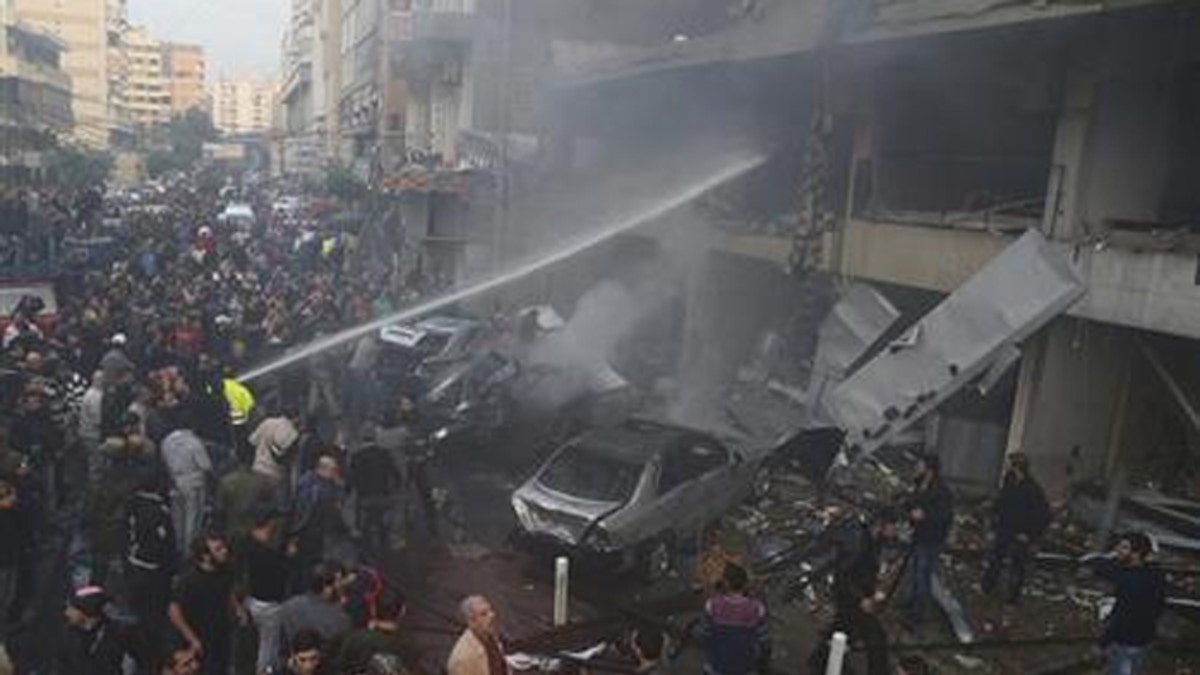
People gather as firefighters attempt to extinguish a fire at the site of an explosion in Beirut's southern suburbs, Jan. 2, 2014. (Reuters)
HAIFA, Israel – Syria's bloody civil war has spread to the streets of Beirut, where it threatens to destroy the hard-fought progress Lebanon's capital has made in coming back from its own civil war that lasted from 1975-1990.
The country that has risen like a phoenix from the ashes of a war that killed more than 120,000 is being dragged into Syria’s vicious struggle because of Lebanese-based terror group Hezbollah backing Syrian President Bashar al-Assad’s regime. That has Al Qaeda, which backs the Syrian rebels, mounting attacks against Hezbollah on the streets of Beirut, once viewed as the Paris of the Middle East. A series of car bombs, assassinations and over-the-border missile attacks have occurred in recent weeks.
Lebanon, a country with a 40-percent Christian population, could become the next front in the war for the rival Muslim Sunni and Shia militias, backed respectively by bitter regional rivals Iran (Shia) and Saudi Arabia (Sunni).
[pullquote]
On Dec. 27, former Lebanese ambassador to the U.S. Mohammad Shatah, an outspoken critic of Hezbollah, was one of seven victims of a strategically placed car bomb in the suburb of the capital. Shatah, also a former Lebanese Finance Minister, was generally viewed as a moderate looking to find a way to stop the spiral of violence and keep his country out of the fight.
On Sunday, Lebanese security officials were joined by FBI agents, who reportedly flew into Beirut for two days to assist the investigation into Shatah’s assassination.
“The Lebanese authorities welcome any international assistance that could help reveal the facts and the perpetrators behind this crime and other crimes, but the investigation remains the sole responsibility of Lebanese judicial and security agencies,” State Prosecutor Samir Hammou told Lebanon’s Daily Star.
Shatah’s murder followed little more than three weeks after the hit on Hezbollah’s technical guru Hassan al-Lakkis, a contract-style killing that the Shia terror organization immediately – as standard – blamed on arch-enemy Israel. It wasn’t long however before the Al Qaeda-linked Abdullah Azzam Brigade, currently fighting against Hezbollah and Assad’s forces across the border in Syria, admitted responsibility for the killing. The Abdullah Azzam Brigade itself suffered a major setback earlier this week when its leader, Saudi-born Majid bin Muhammad al-Majid, was apprehended by the Lebanese army.
A Lebanese state media report on January 4 revealed the unexpected news that Majid had died from kidney failure while in custody the night before.
News of Al -Majid's arrest coincided with reports that Saudi Arabia had pledged $3 billion to the Lebanese government, apparently to beef up the Lebanese Armed Forces (LAF).
According to Tony Badran, a research fellow at the Washington-based Foundation for Defense of Democracies and an expert on Lebanese affairs, the LAF has been heavily infiltrated by Hezbollah, so it would take a great deal more than Saudi money to significantly change the status quo.
”The idea that you can just put in $3 billion dollars and eradicate Hezbollah is nonsensical,” Badran told FoxNews.com. “However, what you can do is buy a stake in it and maybe establish a loyal division of your own. It introduces an element that could break Hezbollah’s domination [of the army].”
After the 2006 conflict with Israel, Hezbollah became the dominant force in Lebanon and was hugely popular throughout the Shia Arab world. As well as re-arming since then and acquiring as many as 100,000 missiles for a future war against Israel, Hezbollah – sponsored, armed, trained and guided by Iran’s Supreme leader Ayatollah Khamenei – is deeply involved in the Syrian civil war. Their involvement in Syria has seen a steep decline in Hezbollah’s popularity in most quarters.
Numerous warnings from moderate Lebanese politicians that Hezbollah would draw Lebanon into a war that was none of its business appear to have been accurate. There have been regular missile attacks from Syrian rebels into Lebanon, while August saw some 27 people and more than 200 injured when a massive bomb exploded in a Hezbollah-dominated area of Beirut.
Less than two weeks later – in what appeared a retaliatory strike - twin car bombs devastated a Sunni mosque in Tripoli, 40 miles north of Beirut, killing 45 people. In November, two suicide bombers targeting the Iranian embassy in Beirut killed at least 23 people, sending a deadly message to Hezbollah’s sponsors Iran. Once again the Sunni Al-Qaeda-linked Al Azzam brigade claimed responsibility as the cycle of violence deepened.
While there are some Lebanese Sunnis fighting in Syria, Badran believes that Hezbollah’s role in the Syrian war was always going to drag Lebanon into the conflict.
“Hezbollah is a major party in the conflict in Syria with a chain of leadership stretching all the way to Tehran," Badran said. "And in terms of it being a strategic base for the conflict it was bound to happen that the conflict would eventually catch up with Lebanon.”
Paul Alster is an Israel-based journalist who can be followed on twitter @paul_alster and at www.paulalster.com
